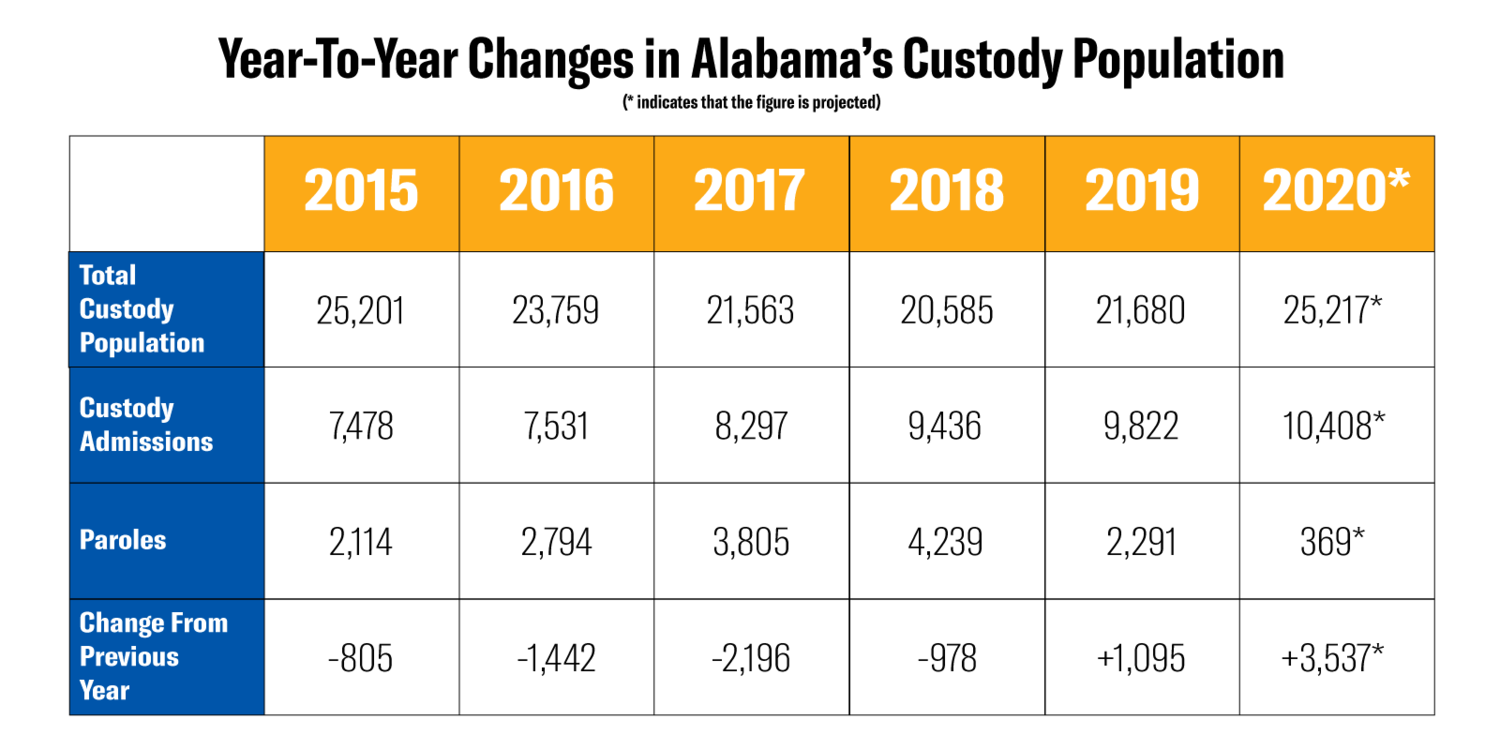Report: Alabama Parole Backlog
ALABAMA PAROLE HEARINGS SHOULD RESUME TO PREVENT UNNECESSARY COVID-19 DEATHS
The backlog of people who are eligible for parole has more than doubled inside Alabama’s overcrowded prisons since Governor Kay Ivey appointed new leadership to take over the parole agency. The accumulation of people waiting for a hearing will only grow as Alabama’s Bureau of Pardons and Paroles (ABPP) has canceled parole hearings through the end of May due to COVID-19 precautions.
With the worsening threat of infection inside prisons, the Campaign for Smart Justice with ACLU of Alabama calls on Governor Kay Ivey and ABPP to resume parole board hearings in order to prevent a worsening backlog of people waiting in Alabama’s dangerous and overcrowded prisons, when they could be safely released on parole.
Since September, an average of 300 people have become eligible for parole each month in ADOC prisons.
An analysis of data available in an online inmate database maintained by the Alabama Department of Corrections (ADOC) revealed close to 4,000 people, or 15 percent of the overall population currently incarcerated in Alabama prisons, were eligible for a parole hearing before April 1, 2020.
Starting in November, Alabama’s parole board has scheduled an average of 173 parole hearings per month, less than half the average number of monthly hearings in FY 2019, and only a third of the average number of hearings held in FY 2018.
The number of parole hearings and grants have drastically dropped since 2018, which had a 54% grant rate.
Additionally, the current board has denied release in 85 percent of cases considered. Only 133 people were granted parole out of the 866 cases considered in the last five months, a grant rate of just 15 percent. In FY 2019, parole was granted to 1,337 people at a grant rate of 31 percent. In FY 2018, 3,732 people made parole at a grant rate of 54 percent.
Contributing to this low grant rate is the current administration’s unwillingness to grant parole to people convicted of a violent offense. Since September, only 35 people with convictions defined as violent have been granted parole, but the majority of those grants involved crimes that arguably do not represent an actual act of violence. 13 of the grants were for people with third degree burglary convictions, a crime that involves burglarizing an unoccupied building, like stealing a lawn mower from a shed. 10 were serving time for drug trafficking. The current board has denied parole to the vast majority of people with violent convictions, many who have served decades in prison.
View fullsize
From January 2019 to August 2019, there were 810 paroles granted. From September 2019 to March 2020, only 133 paroles have been granted.
If these trends continue, Alabama prisons can expect overcrowding to worsen, leading to more violence and higher rates of preventable illness and death. Using ADOC population data, along with the latest data on paroles, the Campaign for Smart Justice projected in January 2020 that Alabama’s already overcrowded prison population would increase by 3,772 people if nothing changed. While that number has decreased to 3,537 since the parole board increased the number of hearings in February and March, this has stalled as parole hearings are currently cancelled due to COVID-19. Unless there is a dramatic increase in the number of parole hearings and parole grants, Alabama’s prison population will continue to skyrocket.
The dramatic drop was precipitated by leadership changes at ABPP and on the parole board in September, 2019. Governor Ivey appointed two career prosecutors to key positions: former Attorney General Charlie Graddick assumed the role of Executive Director of ABPP and Leigh Gwathney, a former Jefferson County prosecutor and assistant attorney general, became chair of the parole board. When Graddick began, he canceled all parole hearings in September and October, over 100 hearings.
The hearing cancellations only added to an existing backlog of people who are eligible for parole but are still waiting to have a hearing scheduled. The parole docket set for March 31, which was canceled due to COVID-19, provides a snapshot of how long some people are waiting for hearings. Of the 39 people on the March 31 docket, 13 had been eligible for a parole hearing for at least six months or longer. One person on the docket had been eligible for one year. An examination of the ADOC database revealed at least 200 people with parole consideration dates in 2018, but no hearing scheduled. Approximately 300 people become eligible for parole each month and every month that the parole board doesn’t hold hearings, the backlog inside the prisons grows.
Unless there is a dramatic increase in the number of parole hearings and parole grants, Alabama’s prison population is projected to increase by 3,537 people in 2020.
Alabama prisons were in crisis long before the COVID-19 pandemic, but the dangerous virus brings the unconstitutional overcrowding into a new, potentially deadly light. Since a scathing report from the U.S. Department of Justice called for reforms in April of 2019, the occupancy rate in Alabama prisons has increased from 165 percent to 170 percent.
Last week a group of Alabama legal academics and law enforcement officials sent a letter to Governor Ivey, urging her to order the parole board to resume hearings on an expedited basis and increase releases. Hearings could be done by utilizing video or other teleconference technology, as demonstrated by other states that are continuing parole hearings, like Mississippi. Georgia’s parole board is reviewing specific cases for clemency release. But Alabama has announced no effort to consider releases or resume parole hearings.
State representative Chris England, D-Tuscaloosa, called on the Bureau to utilize Governor Ivey’s emergency supplemental order from March 18 that allows members of governmental bodies to conduct meetings and “establish a quorum, deliberate, and take action- by means of telephone conference, video conference or other similar communications equipment” during the COVID-19 emergency.
“Our prison system is dangerously overcrowded,” tweeted England on April 8, 2020. “The ABPP has been given the ability to meet by any means of video conference. Instead of figuring out a way to do their part, they stopped holding hearings. Sitting around and waiting to see what happens is not acceptable. It is time to do your part.”
The Campaign for Smart Justice insists that Governor Ivey, the Bureau of Pardons and Paroles and the Alabama Department of Corrections work together to resume parole hearings and expedite releases. The backlog is unacceptable and reckless in the face of this pandemic and the lives of almost 22,000 Alabamians are on the line. For the health and safety of all incarcerated people, as well as ADOC employees and the community at large, it is imperative that Alabama leaders address this crisis.
For more information about the data and how it was collected, please refer to this Appendix.





